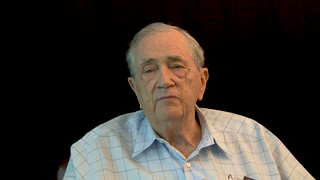4:22 | The Germans kept falling back through small towns until they got to one they felt like defending, then the pattern would repeat. Bob Uhl was a bazookaman, then a runner. As a runner, he was paired with the medic and he pays tribute to the bravery of those men.
Keywords : Bob Uhl artillery German air superiority bazooka tank runner medic

Bob Uhl was a freshman at Georgia Tech but he was also a soldier on paper, having gone into the Army Reserve in 1943. Eventually, the manpower needs of the infantry caught up to him and he was off to basic training. When he shipped out, his convoy was the first to land in France instead of England.
Shortly after arriving in France, Bob Uhl found himself near the Maginot Line, feeling out the German defenses. That operation went well, and in his family correspondence Bob tried to always reassure them, but still they could get a sense of the danger he was in from the media of the day. The unit began to receive replacements after suffering losses and these men were suddenly thrust into an unnerving situation without knowing anyone around them.
It was a cruel winter leading up to the Battle of the Bulge and Bob Uhl recalls how the Germans dropped propaganda leaflets urging the Americans to surrender and get a warm bed. There were no takers. His unit was south of the battle, keeping pressure on the enemy.
They were trying to advance across a railroad cut but the Germans were on top and firing down the cut. As Bob Uhl struggled up the bank with his bazooka, his friend Bill Miley was hit and killed instantly. It was hard to leave his buddy, but he had to press on.
The foxhole was a pretty good thing, if you had time to dig it right and reinforce it, according to Bob Uhl. When he left it, he had to contend with the German 88, a devastating weapon that fired a shell at supersonic speed. It was a multi-purpose weapon, used for anti-aircraft, anti-tank and anti-personnel situations. He managed to dodge that, but a conventional artillery shell sent him to the rear to face an unusual medical situation.
Units were shuffled around continuously and he sometimes found himself back in a position he had previously occupied. That's how Bob Uhl remembers his time on the outskirts of the Battle of the Bulge. When that fight was over, it was just holding the line until March. At that time, a big push began, but his unit, after 155 days of continuous combat, was kept in reserve.
There was a German observation post in a church steeple and every time Bob Uhl's unit tried to move, mortars and artillery pounded them. It was a pretty church and they hated to destroy it, but it had to be done. After conventional artillery failed to take it out, a new weapon was called up. After that, he was disturbed when World War I tactics came into play.
At the Rhine, one of the 44th Infantry Division's units directed the first ground fire across the river into Germany. German resistance stiffened at that point because they were now defending the Fatherland. He recounts an operation to capture a bridge at Heidelberg and another incident which cured him of a strange phobia.
After passing through the devastated city of Reims, Bob Uhl couldn't feel much pity for the German citizens. After all, they had started the conflict. After the war in Europe concluded, he felt the same way about the Japanese who had suffered the atomic bomb used on them. His unit was designated to take part in the invasion of Japan, so naturally he has an opinion on whether President Truman did the right thing.
The German 88 was a formidable weapon, but it had one disadvantage. The high velocity of the shell didn't allow for a timed burst, which was a great tactic to use against ground troops. American technology had developed a new proximity fire shell, which would always explode at a set distance from it's target. This made it very effective.
When Bob Uhl was made a runner, he was given a carbine. It was lighter than his M-1, but the limited range caused him to go back to the powerful rifle for his personal weapon. He never had an incident in his unit of men wounding themselves to get out of duty, but there were plenty of wounded feet from improper footwear. Fortunately, new boots designed for the cold, wet winter conditions were issued.
There were other things than combat going on, recalls Bob Uhl, during the push into Germany. There was the guy who snored loudly, the shovel handle shaped bruise on his posterior, and the amphibious truck driver with a five gallon can of schnapps.
In the push into Germany, Bob Uhl lost a good friend named Calvin Farmer. The enemy was beginning to surrender and Farmer lost his life to some unscrupulous Germans who indicated they were going to do so. They later surrendered but somehow never made it back to the rear. After hostilities ceased, his unit was sent to guard a Bavarian hotel full of political prisoners.
There were lots of bullets and shells flying during that last year of the war in Europe, but Bob Uhl was spared and went on to have a full life. He always remembers the 28 men from his company who didn't have that opportunity and he memorialized them at the Infantry Museum at Fort Benning.